A produce giant is making changes for the sake of sustainability.
Fresh Del Monte's conservation efforts focus on biological corridors that facilitate wildlife movement, including that of endangered species such as jaguars in Costa Rica, Agriculture Dive reported in November. In its 2021 sustainability report, Fresh Del Monte noted the corridors protect the biodiversity of other fauna and flora as well.
"Around 30% of our land is set aside for conservation," chief sustainability officer Hans Sauter told Agriculture Dive. "And not only do we set it aside, we have been elevating the level of those efforts by bringing expert advice to monitor the health of these ecosystems."
Agriculture Dive painted a picture of a jaguar trekking through a nature preserve on the edge of a pineapple plantation in Puntarenas as workers harvested the fruit. Jaguars are the largest cat in the Americas, and they require 30 to 60 square miles for a home range. Their habitat has shrunk to 51% of its historic area, and they are critically endangered in Costa Rica.
In addition to this endeavor, Fresh Del Monte is working on reducing its pollution and improving its regenerative agriculture operations. In its 2022 sustainability report, it noted it decreased its Scope 1 and 2 pollution by 26% by optimizing fertilizer usage and fuel consumption and making facility heating and animal feed adjustments at its poultry facility in Jordan. It had cut its emissions the year prior by 22% via similar methods.
The 2022 report also heralded the arrival of the first carbon-neutral pineapple, achieved via insetting rather than the popular offsetting, or purchasing of carbon credits.
Fresh Del Monte owns farms that produce about half of its produce, according to Agriculture Dive, and 30% of them use regenerative practices. The company hopes to increase the implementation of regenerative and soil health management practices on supplier farms from 17% to 100% by 2030.
"We want to take those practices also to our own suppliers," Sauter told Agriculture Dive. "By testing practices on our own farms, that gives us the moral authority to talk from a different perspective with our suppliers."
Join our free newsletter for cool news and actionable info that makes it easy to help yourself while helping the planet.









